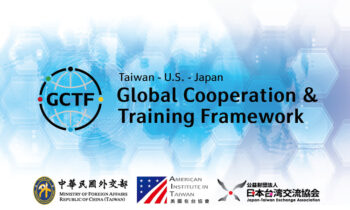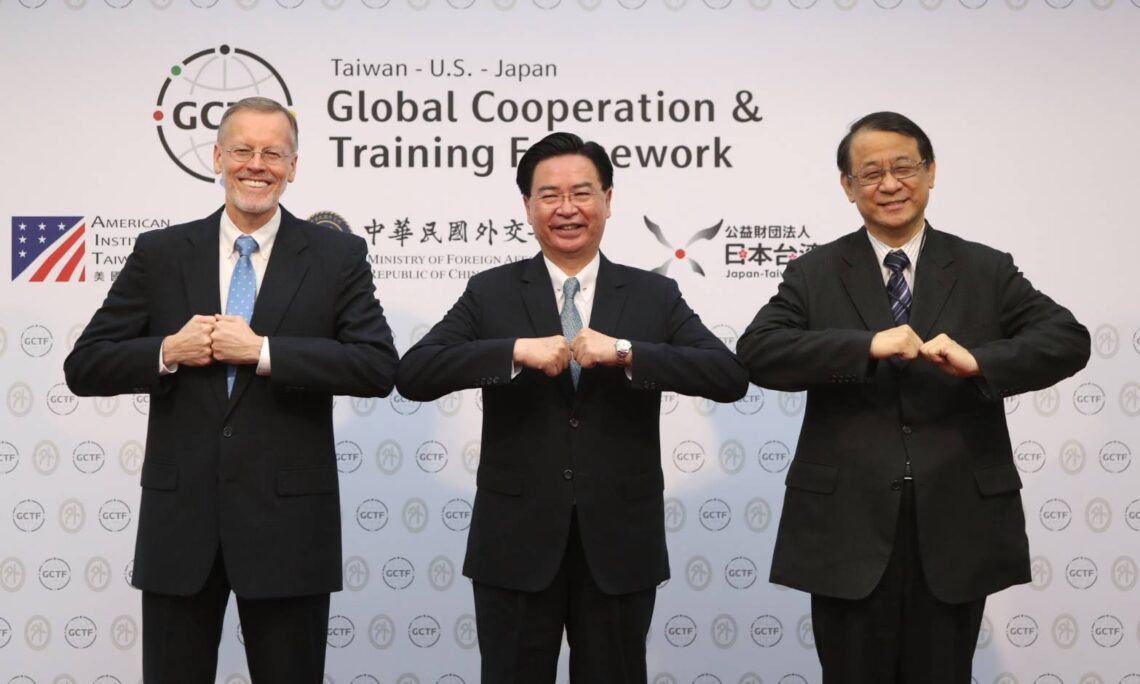
Joint Statement on the 5th Anniversary of the Global Cooperation and Training Framework
On June 1, 2015, the Global Cooperation and Training Framework (GCTF) was established to provide a platform through which Taiwan could contribute to global problem solving and share its expertise with partners across the region. Taiwan’s frequent exclusion from international bodies has largely deprived the world of its humanitarian assistance, technical know-how, and rich experience as a democratic success story. GCTF workshops have allowed Taiwan to partner with the American Institute in Taiwan, and as of last year, the Japan-Taiwan Exchange Association, to share its expertise with countries across the Indo-Pacific and around the globe.
On the fifth anniversary of the GCTF, we are proud to celebrate the many ways that this platform has addressed critical global challenges and built the capacity of government officials, private sector actors, and civil society. Together, we have provided extensive training to hundreds of participants representing dozens of countries from every region. Training has covered a diverse collection of topics, such as public health, energy security, disaster relief, law enforcement, media literacy, and women’s empowerment.
To further strengthen this trilateral partnership, we will seek greater cooperation in the following areas:
- Expand the frequency, size, and scope of the GCTF workshops, including holding more events outside Taiwan;
- Expand the depth and breadth of participation from like-minded countries, including co-hosting programs;
- Establish a GCTF task force under the Department of North American Affairs, the Ministry of Foreign Affairs as the GCTF Secretariat;
- Establish the GCTF Alumni Network to build and expand networks and organize reunions for former GCTF participants.
We are proud of what we have accomplished over these past five years, but our work is far from finished. We look forward to continuing and expanding this partnership that has benefited so many people around the world.
Ministry of Foreign Affairs
Minister Jaushieh Joseph Wu
American Institute in Taiwan
Director Brent Christensen
Japan-Taiwan Exchange Association Taipei Office
Chief Representative Hiroyasu Izumi
PR-2015
June 1, 2020
Global Cooperation & Training Framework (GCTF) Programs 5th Anniversary Fact Sheet
The United States, Taiwan, and the Japan-Taiwan Exchange Association jointly administer the Global Cooperation and Training Framework (GCTF), which serves as a platform for Taiwan to share its expertise with partners around the world. Taiwan has world-class experts in a wide variety of fields, including public health, law enforcement, disaster relief, energy cooperation, women’s empowerment, digital economy and cyber security, media literacy, and good governance. However, because many international institutions do not allow Taiwan to participate, Taiwan’s experts are not able to share their knowledge. The GCTF allows practitioners from around the world to learn what Taiwan has to offer and to strengthen connections between experts in different countries as they tackle 21st century problems that do not respect borders. Japan joined the UNITED STATES and Taiwan to cohost the programs since 2019.
- 23 workshops
- 38 countries
- 500+ participants
2020 (Co-hosted by the United States, Taiwan, and Japan)
Combatting COVID-19 Disinformation
Date: April 29, 2020
Summary: Social media influencers, technologists, journalists, and members of the fact-checking and media literacy communities discussed trends and effective tactics for refuting COVID-19 disinformation.
Number of participating countries: 9
2019 (Co-hosted by the United States, Taiwan, and Japan)
Good Energy Governance in the Indo-Pacific
Date: November 20-22, 2019
Summary: This workshop shared best practices for good energy governance in the Indo-Pacific and covered topics of oil and gas security, electricity security, energy resilience, and regional cooperation.
Number of participating countries: 11
4th co-hosting country: Australia
International Austronesian Languages Revitalization Forum (in Koror, Palau)
Date: September 29, 2019
Summary: As the first workshop outside Taiwan, it focused on identifying ways to preserve and revitalize Austronesian languages.
Number of participating countries: 10
Defending Democracy through Media Literacy II
Date: September 10-11, 2019
Summary: The workshop focused on identifying ways that disinformation can influence democratic elections and assessing media literacy campaign results, providing a platform for governments and civil society to cooperate on effective initiatives to strengthen democracy.
Number of participating countries: 12
4th co-hosting country: Sweden
Network Security and Emerging Technology
Date: May 28-30, 2019
Summary: The workshop highlighted the importance of network security as a foundation for a dynamic digital economy as well as the government’s commitment to working with regional partners in tackling global information security threats.
Number of participating countries: 21
Multi-Drug-Resistant Tuberculosis
Date: April 30-May 3, 2019
Summary: Participants brainstormed ways to combat multi-drug-resistant tuberculosis.
Number of participating countries: 9
Women’s Economic Empowerment
Date: April 16-17, 2019
Summary: Participants shared and learned ways to increase female workforce participation, and to empower women to pursue their ideals.
Number of participating countries: 18
Anti-Corruption in the Public and Private Sectors
Date: March 26-28, 2019
Summary: Participants discussed topics of promoting clean governance, preventing corporate espionage, and preserving national competitiveness through trade secret protection.
Number of participating countries: 18
2018 (Cohosted by the United States and Taiwan)
Achieving 50-50: Empowering Women Leaders in the Indo-Pacific Region
Date: December 10-12,2018
Summary: The workshop examined, shared and discussed essential measures to be taken to achieve increased participation and representation of women in leadership positions in both private and public organizations.
Number of participating countries: 13
Humanitarian Assistance and Disaster Relief
Date: December 14, 2018
Summary: Participants shared best practices and looked for ways to integrate disaster response capabilities of the public, private, and civil sectors into the regional preparedness and response efforts.
Number of participating countries: 10
Defending Democracy through Media Literacy
Date: October 18, 2018
Summary: Discussions touched on challenges to combating disinformation on the Internet and social media, and the roles that the government, private industry, and civil society can play in fostering robust and fact-based public debates.
Number of participating countries:10
Combating Transnational Crime and Forensic Science
Date: August 14-15, 2018
Summary: Law enforcement and expert representatives discussed issues ranging from passport fraud, narcotics trafficking, to counterfeit money. Transnational cooperation between intelligence and various law enforcement agencies was stressed as a necessity to combat crime to promote a more stable region for facilitating regional development.
Number of participating countries: 16
Enteroviruses Laboratory Diagnosis
Date: April 23-26, 2018
Summary: The workshop focused on the discussions about the diagnosis of the enterovirus, one of the most common causes of hand, foot, and mouth disease and featured a demonstration of the EV-71 rapid test kit developed by Taiwan’s Centers for Disease Control.
Number of participating countries: 14
2017 (Cohosted by the United States and Taiwan)
Enhancing Broadband Penetration and Bridging the Digital Divide
Date: December 4-8, 2017
Summary: Attendees discussed various ways to reach the approximately 3.6 billion people-half the world’s population- who do not have access to the internet.
Number of participating countries: 11
Building and Bright Future for Women Entrepreneurs in Tech
Date: November 14-16, 2017
Summary: In addition to identifying common challenges faced by women in the tech sphere, the workshop explored ways to expanding opportunities for women entrepreneurs in the tech sector to promote inclusive growth and development.
Number of participating countries: 10
Humanitarian Assistance and Disaster Relief
Date: July 5, 2017
Summary: Participants learned and brainstormed effective ways to enhance humanitarian assistance and disaster relief.
Number of participating countries: 6
Mosquito-borne Viral Diseases Laboratory
Date: April 25, 2017
Summary: The workshop focused on lab techniques for detecting mosquito-borne viral diseases with the aim to assist South and Southeast Asian nations in establishing the capability to detect a differentiate dengue fever, chikungunya, and Zika within one work day.
Number of participating countries: 13
2016 (Cohosted by the United States and Taiwan)
E-Commerce Facilitation
Date: October 5-11, 2016
Summary: Participants discussed and focused on best practices to ensure a policy framework that can unleash the potential of e-commerce and the new digital economy.
Number of participating countries: 11
Energy Efficiency
Date: June 16, 2016
Summary: The workshop focused on the attainment of cost-effective ways to achieve economic goals in the energy efficiency area while reducing carbon emissions and improving air quality.
Number of participating countries: 10
Laboratory Diagnosis for Zika
Date: April 13, 2016
Summary: Participants focused on the diagnosis of Zika.
Number of participating countries: 7
Women’s Empowerment
Date: March 11, 2016
Summary: To promote greater economic and political empowerment for women, participants discussed common challenges to women empowerment and brainstormed policy recommendations.
Number of participating countries: 6
2015 (Cohosted by the United States and Taiwan)
Dengue Prevention and Control
Date: December 7, 2015
Summary: By sharing knowledge and information, participants learned about dengue fever prevention, control and responses, with an aim to strengthen regional capacity to respond to dengue threats and ensure global health security.
Number of participating countries: 11
Molecular Diagnosis of MERS-CoV
Date: August 12-14, 2015
Summary: Participants learned and discussed the best practices for diagnosing and controlling Middle East Respiratory Syndrome Coronavirus (MERS-CoV), in order to strengthen laboratory diagnostic capacities and prepare professionals in the region with tools needed.
Number of participating countries: 8
















![Video Thumbnail [Recovered]-01](../wp-content/uploads/sites/269/Video-Thumbnail-Recovered-01-1-750x450.jpg)





